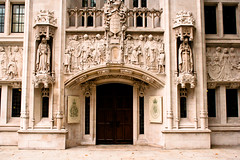A structure for comparative analysis of Freedom of Expression
 Prof Adrienne Stone (pictured left), Director of Centre for Comparative Constitutional Studies in the Melbourne Law School has just made a very interesting article available on SSRN. It is The Comparative Constitutional Law of Freedom of Expression, forthcming as a chapter is in Rosalind Dixon and Tom Ginsburg (eds) Research Handbook in Comparative Constitutional Law (Edward Elgar, forthcoming, 2011). Stone argues:
Prof Adrienne Stone (pictured left), Director of Centre for Comparative Constitutional Studies in the Melbourne Law School has just made a very interesting article available on SSRN. It is The Comparative Constitutional Law of Freedom of Expression, forthcming as a chapter is in Rosalind Dixon and Tom Ginsburg (eds) Research Handbook in Comparative Constitutional Law (Edward Elgar, forthcoming, 2011). Stone argues:
…Freedom of expression is among the most widely protected of constitutional rights. Rights of freedom of expression can be found in constitutions drawn from all continents. … Even in those few democracies without comprehensive constitutional protection of rights, freedom of expression finds constitutional protection in other ways. It can plausibly be argued that parliamentary systems … – even in the era before the adoption of charters of rights – recognized a constitutional principle of freedom of expression that, though not enforceable by judicial review, was understood as a fundamental value that informed the reading of statutes and the common law. In addition, there are some legal systems that recognize a judicially enforceable principle of freedom of expression despite the absence of a written constitutional right.
… some scholars … question whether … the comparing free speech principles across constitutional systems is practical or useful for courts interpreting or applying constitutional principles of freedom of expression … The complexity of (and disagreement about) underlying philosophical commitments, the opacity of judicial decision making, and cultural specificity of any particular body of law, … [are] formidable problems for the comparativists, … and the] case for comparativism may be weaker in relation to constitutional principles have developed their own rich set of resources and a distinctive conception of freedom of expression.






 I learn from this week’s New Yorker (cover, left) that the
I learn from this week’s New Yorker (cover, left) that the